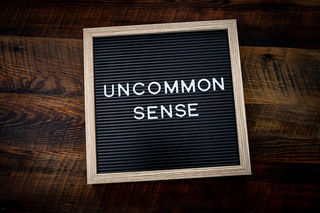Psychology
There's No Such Thing as Common Sense
Unpacking the psychology behind why suggestions to use "common sense" are flawed
Posted May 7, 2020 Reviewed by Matt Huston

Early on in my first assistant professor job, there was a day where I completely lost my bananas. In a way no one without tenure should ever do. A chemist came to a meeting of social scientists that I was attending and suggested the university should partner with a soft drink company to promote consumption of their beverages in moderation. He didn’t realize there is a whole science around understanding self-control.
I’m a researcher of self-control. I conduct experiments and other research studies to understand how people think about self-control as well as how people can be better at controlling their behaviors. I knew right away this chemist had a bad idea. But the truth was, no one had conducted research on the idea of moderation at that point. I know because immediately after that meeting, I scoured our research databases looking for science to send my colleague’s way. With no evidence to be found, it was up to me to do the science. I texted my husband that I’d be home late and within a few hours wrote an application for ethics approval in which I proposed a series of studies about how people think about moderation and how moderation messages affect their behavior.
Why did I flip out about the notion of moderation? Two big reasons.
The first problem with the idea of moderation is that it’s what we goals researchers call an ambiguous standard. Did I eat chocolate chip cookie dough in moderation yesterday? Well, I had some. I can’t deny that fact. But I didn’t eat the whole container, either. So, where do I draw the line of ‘moderation'?
We ran research to find out, except we asked people about moderation in eating fully baked cookies. Specifically, we asked people how many freshly baked cookies (we really baked them right there in the lab and heaped them on a plate right in front of people) people should eat, could eat in moderation, and would eat to completely indulge. People defined moderation as far less than indulging. So that’s good news. But they also defined it as 1.5 times the number of cookies they should eat, a statistically significant difference. It’s a practically significant difference, too. If people made just one eating decision per day like they did in our research lab—if they ate in "moderation" instead of eating as much as they should during just one meal or snack once a day—they would consume an estimated 25,000+ extra calories over the span of a year. That’s more than 8 pounds of body weight for an average person. Little ambiguities add up.
Here’s the second problem with moderation—the concept means something different to every person. When we studied this problem with moderation we found that the people who really liked certain food items tended to be more generous with their definition of moderation—but only with the items they liked. This means I think it’s perfectly appropriate to consume about 20 ounces every day of Diet Coke (my personal preference for unhealthy indulgence) while simultaneously judging someone who drinks one 12 ounce can of regular soft drinks a week.
So what does this have to do with common sense, and what does it mean for you?
Common sense has the same two problems as moderation. First, common sense is ambiguous. Without clear guidelines about how to behave, common sense leaves too much open to interpretation and will be difficult to enforce.
Second, common sense is not really common at all. No one is likely to agree about what common sense is. Sometimes these differences will be reasonable—what’s common sense in a city is not the same as what’s common sense in a small town. But other times these differences could be problematic, especially because people are likely to be biased by what they want to do. The more people want to do something, the more they are going to think it fits into the category of common sense, just the way our participants who liked gummy snacks were more generous in their beliefs about how many fruit-shaped treats could count as moderation. We aren’t going to agree about what’s right when it’s influenced by our beliefs.
At the present moment, not all of us are receiving clear guidelines about how to behave. The CDC has written a report with detailed guidelines for reopening parts of the country, and maybe we’ll get to see them, but that doesn’t seem likely. You might be urged by some politicians or family members to just "use common sense." Just as my group of social scientists would have been irresponsible to promote consuming soft drinks in moderation, however, it’s reckless for public health to rely on a phrase that means too many things to too many people.
You might not get definitions of common sense at the national or state level, but you can have conversations within your sphere of influence to make sure you have a common understanding. Ask your friends, family, loved ones, and service providers if they are wearing masks, where they are going and how often, and what kind of risks they are actually taking. Be honest and thorough about your expectations of the people with whom you will interact. Take the time to put common understanding back in common sense.
Facebook image: igorstevanovic/Shutterstock
References
vanDellen, M. R., Isherwood, J. C., & Delose, J. E. (2016). 836001. How do people define moderation?. Appetite, 101, 156-162.
Latham, G. P., & Locke, E. A. (2006). Enhancing the benefits and overcoming the pitfalls of goal setting. Organizational dynamics, 35(4), 332-340.
Sanitioso, R. B., & Wlodarski, R. (2004). In search of information that confirms a desired self perception: motivated processing of social feedback and choice of social interactions. Personality and Social Psychology Bulletin, 30, 412-422.
Leone, T., Pliner, P., & Herman, G. P. (2007). Influence of clear versus ambiguous normative information on food intake. Appetite, 49, 58-65.
Carver, C. S., & Scheier, M. F. (1981). Attention and self-regulation: A control-theory approach to human behavior. New York: Springer-Verlag.


